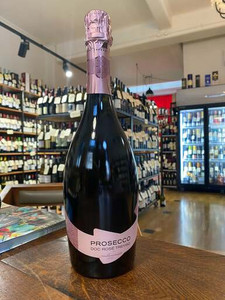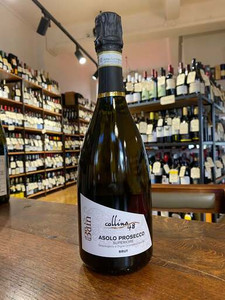
TASTING NOTES
This Prosecco offers the truest expression of the Glera variety, displaying the aromatic bouquet that is typical of this grape variety together with vivid mineral notes, hints of bread crust and bright acidity. Pleasantly refreshing, it exhibits superb harmony and elegance, crowned with a notably dry finish.
FOOD PAIRING
An exclusive Prosecco of great personality. It is a delightful aperitif wine and a perfect palate cleanser. Great with seafood-based dishes and delicacies from the raw bar.
SERVING TEMPERATURE
6 – 8 °C
GRAPE VARIETY OR BLEND
100% Glera.
TERROIR AND CLIMATE
The Glera grapes for our Prosecco DOC Treviso spumante brut are harvested from family-owned vineyards located at the foot of the hills called “Colli Asolani” (within the province of Treviso, Veneto). These vineyards are at an altitude of about 150mt above sea level, have good sun exposure and benefit from the mild, temperate climate of the area. The soil composition is a balanced combination of silt, clay and sand.
YIELD
18 tons/ha. Estimated yield per plant: 7-8 kg.
WINEMAKING
The destemmed grapes are soft pressed and the juice is fermented at low temperature in a stainless steel tank to preserve the fresh fruit flavors that are typical from the Glera variety. After about 10 days the wine has achieved a sufficient, yet low alcohol content and the primary fermentation is complete. Bubbles are developed naturally during the secondary fermentation, according to the Martinotti-Charmat method. We introduce the base wine into pressurised stainless steel tanks along with selected yeasts and sugar which stimulate the production of natural bubbles of carbon dioxide in the wine. At the end of the process the wine is left with a very low residual sugar. After achieving DOC certification, the Prosecco is bottled under pressure to preserve the bubbles, using our state-of-the-art bottling line.
TECHNICAL DATA
Alcohol: 11% vol
Total acidity: 5,2‰
Dry extract: 15‰
Residual sugar: 4 g/l
Pressure: 4,5 bar
Bedin -
Società Agricola Colli Asolani
The history of the “Società Agricola Colli Asolani” dates back to the early 1900, when the great grandfather Giovanni Bedin started working as a nurseryman and growing his own vines. At that time in northern Italy the rural landscape was dominated by vines growing together with mulberries, whose leaves constituted the sole food source for silkworms.
Giacomo Bedin, the grandfather, inherited his father’s passion for the land and followed his footsteps purchasing the estate in Cornuda in 1948. Here, in the smooth fertile hills that overlook the sanctuary of “Madonna della Rocca”, he planted the first vineyards and passed down to his son Giovanni the constancy and resourcefulness of the past generations.
Giovanni Bedin combined the ever increasing viticultural activity with stock-breeding. Under his direction, in the late ‘60s, the company promoted the first edition of the “Mostra del vino” in Cornuda: a traditional wine exhibition that contributed to the strengthening of the relationship between the territory, its inhabitants and its quality wines, destined to become internationally-awarded excellences. Giovanni carried on the stock-breeding activity until the second half of the ‘80s and planted three hectares of vineyards altogether, introducing his sons to the art of winemaking.
Enrico Bedin, the current owner, and his brothers Luigi, Denis and Damiano joined the company and marked a turning point by gradually transforming it from a traditional farm to a modern winery, in line with prevailing market demands. The Bedin brothers, remaining faithful to the core values they inherited from their ancestors, enriched the estate with the acquisition of new vineyards and the construction of new winemaking, bottling and packaging facilities.
Today the “Società Agricola Colli Asolani”, with its 40 hectares of vineyards, is a modern winery, projected into the future but well-rooted in the past of his homeland. After four generations, the Bedin family still manages to transform its passion into a career, combining the careful attention to product quality with the efforts to enhance and promote the territory through the preservation of autoctone vines, rich in aromas and flavours of the local countryside.








